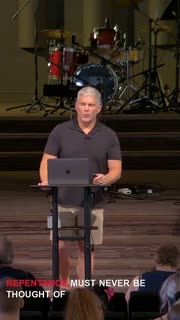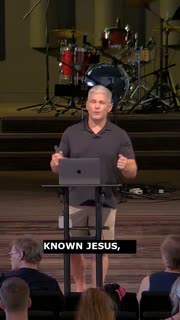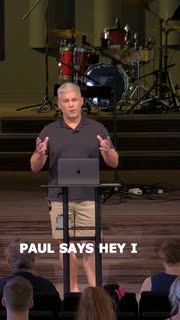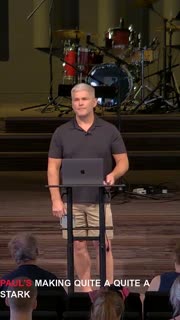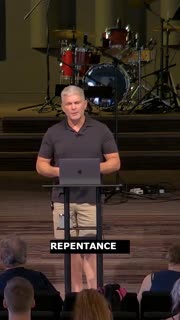Repentance and Faith: Paul's Timeless Message
Devotional
Sermon Summary
Bible Study Guide
Sermon Clips
### Quotes for Outreach
1. "What do we teach? We teach believe, be baptized, trust in Jesus for salvation. Jesus is the answer. God is good. Jesus loves you and he died for you and for your sins." [52:28] (13 seconds)
2. "Repentance must never be thought of something we must do before we can come back to God. Repentance describes the very act of coming to God. You can't turn towards God without turning from the things he's against." [01:07:35] (17 seconds)
3. "Godly grief that grieves your heart to repent, turning from sin that offends God, believing that God's grace in Jesus Christ's sacrifice for you on the cross is sufficient to restore your relationship, experiencing abundant life here, now, and forevermore." [01:12:28] (21 seconds)
4. "If you've never known Jesus, repent and know Jesus. And if you know Jesus, repent and come to a place of restoration in your relationship. Jesus says in John 15, abide in me and I in you. You can't abide in Jesus, and he can't abide in you unless you have restored relationship." [01:11:05] (26 seconds)
5. "In 2 Peter 3-9, it says God desires that all people come to repentance so that none would perish, but we'd have life. So the Bible describes, I want to take, what does that look like? What does this life look like? In Acts 11, 18, it says, they glorified God, saying, then to the Gentiles also, God has granted repentance that leads to life." [01:09:25] (24 seconds)
### Quotes for Members
1. "Paul directed by the Holy Spirit we know it's directed by the Holy Spirit because this is what's recorded this is what he said and this is what Luke recorded says to them that they've got to remember something there's something important and what is it repentance towards God and peace and faith in Jesus Christ." [49:28] (22 seconds)
2. "Paul says hey I know by the Spirit he's telling me I'm never going to see any of you again well what would I say to you if I knew this is the last time that I would see any of you never again would I see you what would I say what would I choose to say he knows that he's got his time on the earth is limited he knows that it's going to be difficult and this is his last opportunity to instruct and to teach them." [47:15] (25 seconds)
3. "Paul's making quite a quite a stark contrast between two types of grief and two types of repentance one comes from godly grief and one comes from worldly grief one leads to life and the other leads to death." [54:12] (15 seconds)
4. "God's desire is that all men Jews and Gentiles would repent towards God and believe in the Lord Jesus Christ and I'll remind you again he's not speaking to or about non-believers he says listen you leaders pay careful attention to this protect the flock with this teach this remind them of this why because fierce wolves that's how he describes them fierce wolves will come even some from within the church with twisted teachings false watered down teachings and they're going to attempt to turn the believers away for their own profit notoriety and gain." [51:09] (51 seconds)
5. "Repentance describes the very act of coming to God. You can't turn towards God without turning from the things he's against. I hope my old friend repentance is not dead. I am desperately in love with repentance. It seems to me to be the twin sister of faith. Godly repentance in faith, turning away from sin and turning to God. Paul says that equals salvation, without regret. Nothing better." [01:07:35] (36 seconds)
Ask a question about this sermon
1. "What do we teach? We teach believe, be baptized, trust in Jesus for salvation. Jesus is the answer. God is good. Jesus loves you and he died for you and for your sins." [52:28] (13 seconds)
2. "Repentance must never be thought of something we must do before we can come back to God. Repentance describes the very act of coming to God. You can't turn towards God without turning from the things he's against." [01:07:35] (17 seconds)
3. "Godly grief that grieves your heart to repent, turning from sin that offends God, believing that God's grace in Jesus Christ's sacrifice for you on the cross is sufficient to restore your relationship, experiencing abundant life here, now, and forevermore." [01:12:28] (21 seconds)
4. "If you've never known Jesus, repent and know Jesus. And if you know Jesus, repent and come to a place of restoration in your relationship. Jesus says in John 15, abide in me and I in you. You can't abide in Jesus, and he can't abide in you unless you have restored relationship." [01:11:05] (26 seconds)
5. "In 2 Peter 3-9, it says God desires that all people come to repentance so that none would perish, but we'd have life. So the Bible describes, I want to take, what does that look like? What does this life look like? In Acts 11, 18, it says, they glorified God, saying, then to the Gentiles also, God has granted repentance that leads to life." [01:09:25] (24 seconds)
### Quotes for Members
1. "Paul directed by the Holy Spirit we know it's directed by the Holy Spirit because this is what's recorded this is what he said and this is what Luke recorded says to them that they've got to remember something there's something important and what is it repentance towards God and peace and faith in Jesus Christ." [49:28] (22 seconds)
2. "Paul says hey I know by the Spirit he's telling me I'm never going to see any of you again well what would I say to you if I knew this is the last time that I would see any of you never again would I see you what would I say what would I choose to say he knows that he's got his time on the earth is limited he knows that it's going to be difficult and this is his last opportunity to instruct and to teach them." [47:15] (25 seconds)
3. "Paul's making quite a quite a stark contrast between two types of grief and two types of repentance one comes from godly grief and one comes from worldly grief one leads to life and the other leads to death." [54:12] (15 seconds)
4. "God's desire is that all men Jews and Gentiles would repent towards God and believe in the Lord Jesus Christ and I'll remind you again he's not speaking to or about non-believers he says listen you leaders pay careful attention to this protect the flock with this teach this remind them of this why because fierce wolves that's how he describes them fierce wolves will come even some from within the church with twisted teachings false watered down teachings and they're going to attempt to turn the believers away for their own profit notoriety and gain." [51:09] (51 seconds)
5. "Repentance describes the very act of coming to God. You can't turn towards God without turning from the things he's against. I hope my old friend repentance is not dead. I am desperately in love with repentance. It seems to me to be the twin sister of faith. Godly repentance in faith, turning away from sin and turning to God. Paul says that equals salvation, without regret. Nothing better." [01:07:35] (36 seconds)

